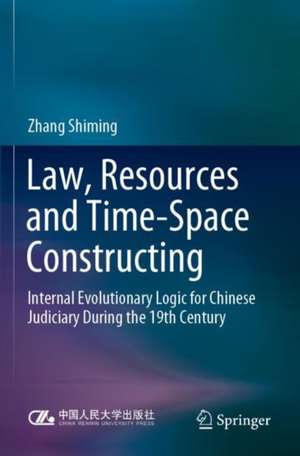Law, Resources and Time-Space Constructing: Internal Evolutionary Logic for Chinese Judiciary During the 19th Century
Autor Zhang Shimingen Limba Engleză Paperback – 19 ian 2023
This book studies the judicial evolution of the Qing Dynasty. It sums up the changes from six major aspects:
1. Banfang(班房)emerged in the late Qianlong period; 2. The opening of capital appeals(京控)early in Jiaqing’s reign; 3. The consular jurisdiction was established during Daoguang’s reign; 4. The execution on the spot (就地正法)was started in Daoguang and Xianfeng periods; 5. The introduction of fashenju (发审局,a interrogatory court) happened during Tongzhi’s reign; 6. Late in Guangxu’s reign, banishment was abolished, and reforms were made for prisons.
In the past, people did not have a comprehensive understanding of these big changes. From the perspective of legal culture, scholars often criticize traditional Chinese law focuses on criminal law while ignores civil law in terms of legal culture, but this situation can be explained in part by the inadequate allocation of resources and authoritarian resources in traditional societies. Using a large number of archives and precious materials such as private notes that were not noticed by academics in the past, this book adopts the research path of new historical jurisprudence to explore the inner logic of judicial evolution in the Qing Dynasty, focusing on the triangular connection between legal rules, resources, and temporal and spatial constructions, which is an important contribution to the study of traditional Chinese law.
| Toate formatele și edițiile | Preț | Express |
|---|---|---|
| Paperback (1) | 726.82 lei 6-8 săpt. | |
| Springer Nature Singapore – 19 ian 2023 | 726.82 lei 6-8 săpt. | |
| Hardback (1) | 732.21 lei 6-8 săpt. | |
| Springer Nature Singapore – 18 ian 2022 | 732.21 lei 6-8 săpt. |
Preț: 726.82 lei
Preț vechi: 886.37 lei
-18% Nou
Puncte Express: 1090
Preț estimativ în valută:
139.08€ • 145.50$ • 115.53£
139.08€ • 145.50$ • 115.53£
Carte tipărită la comandă
Livrare economică 02-16 aprilie
Preluare comenzi: 021 569.72.76
Specificații
ISBN-13: 9789811680571
ISBN-10: 9811680574
Pagini: 265
Ilustrații: VI, 265 p. 19 illus., 12 illus. in color.
Dimensiuni: 155 x 235 mm
Greutate: 0.42 kg
Ediția:1st ed. 2021
Editura: Springer Nature Singapore
Colecția Springer
Locul publicării:Singapore, Singapore
ISBN-10: 9811680574
Pagini: 265
Ilustrații: VI, 265 p. 19 illus., 12 illus. in color.
Dimensiuni: 155 x 235 mm
Greutate: 0.42 kg
Ediția:1st ed. 2021
Editura: Springer Nature Singapore
Colecția Springer
Locul publicării:Singapore, Singapore
Cuprins
Introduction.- Between “Paper Law” and “Living Law”: Banfang in Qing Dynasty.- Inter-Law: Consular Jurisdiction and Modern Judicial Operation in China.- Institutional Constraints and Innovations: The Adjudicative Bureaus (Fashenju) in Late-Qing China.- A Study on Execution on the Spot in Late Qing.- Painting and Photography in Foreigners’ Construction of An Image of Qing Dynasty Law.- Re-Examination of Abolishing Consular Jurisdiction as the Start of Law Modification in Late Qing.- Conclusion.- Index.
Notă biografică
Zhang Shiming is a professor of law and doctoral supervisor, Renmin University, China. He won the special prize of the "13th Beijing Philosophy and Social Science Outstanding Achievement Award", the first prize of the third "Chinese Law Outstanding Achievement Award" of the Chinese Law Society, successively studied in the Max Planck Institute of Intellectual Property, Competition Law and Tax Law, the University of Freiburg in Germany, the Princeton Institute for Advanced Study in the United States, and the University of Tokyo in Japan. He is the chief editor of "Economic Law and Legal Anthropology Research Series" (ten currently published books such as "Systemization and Methodology of Economic Law: New Developments in Competition Law", "The Philosophy of Economic Law", and "The Theory of Competition Law and Intellectual Property").
His personal representative monographs include "Law, Resources and the Construction of Time and Space: China from 1644 to 1945" (Originally published by Guangdong People's Publishing House, 2012 in Chinese) completed with 17 years of hard work and "Economic Law Theory Evolution Theory" "(Revised third Chinese edition), and so on.
Textul de pe ultima copertă
This book studies the judicial evolution of the Qing Dynasty. It sums up the changes from six major aspects:
1. Banfang(班房)emerged in the late Qianlong period; 2. The opening of capital appeals(京控)early in Jiaqing’s reign; 3. The consular jurisdiction was established during Daoguang’s reign; 4. The execution on the spot (就地正法)was started in Daoguang and Xianfeng periods; 5. The introduction of fashenju (发审局,a interrogatory court) happened during Tongzhi’s reign; 6. Late in Guangxu’s reign, banishment was abolished, and reforms were made for prisons.
In the past, people did not have a comprehensive understanding of these big changes. From the perspective of legal culture, scholars often criticize traditional Chinese law focuses on criminal law while ignores civil law in terms of legal culture, but this situation can be explained in part by the inadequate allocation of resources and authoritarian resources in traditional societies. Using a large number of archives and precious materials such as private notes that were not noticed by academics in the past, this book adopts the research path of new historical jurisprudence to explore the inner logic of judicial evolution in the Qing Dynasty, focusing on the triangular connection between legal rules, resources, and temporal and spatial constructions, which is an important contribution to the study of traditional Chinese law.
Caracteristici
Serves as an important academic contribution to the study of traditional Chinese law Explores the triangular relationship between legal rules, resources, and the construction of time and space Uses large number of archives and valuable materials such as private notes that have gone unnoticed by academics in past
